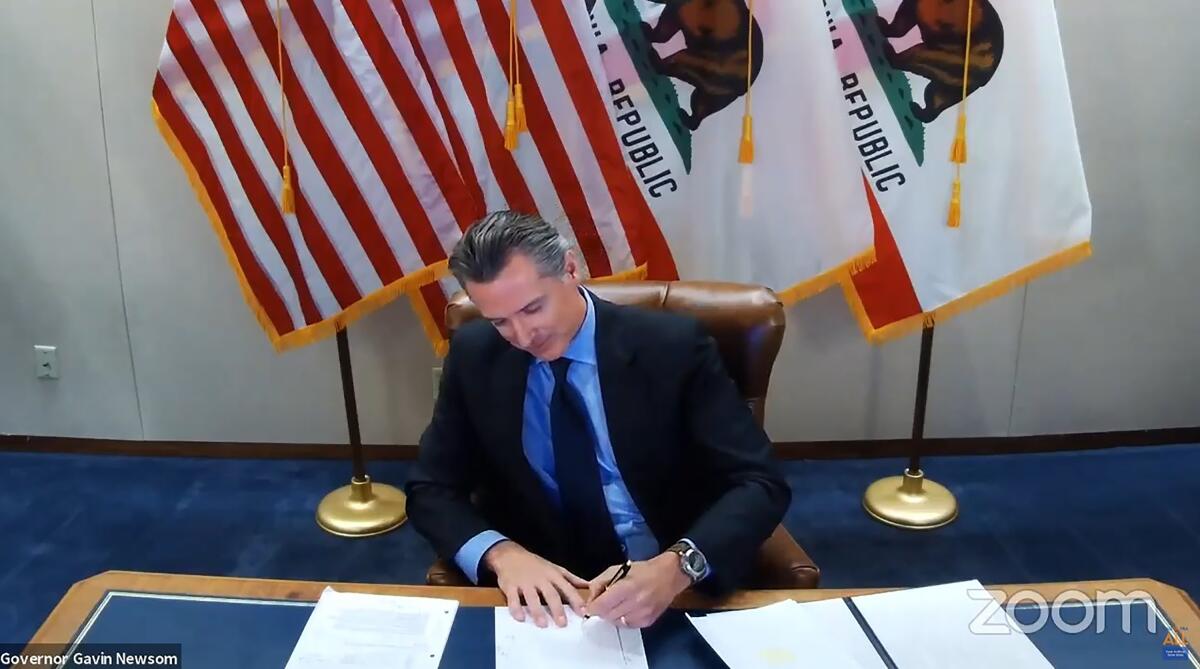Crime, labor and reparations: What to know about the state bills awaiting their fate

- Share via
Good morning. It’s Friday, Sept. 6. Here’s what you need to know to start your day.
- What some bills that made it (or didn’t) to Newsom’s desk tell us about Sacramento’s priorities.
- Hamas releases video of slain hostage Hersh Goldberg-Polin.
- Ringo Starr, who performs at the Greek Theatre on Sunday, remembers how he put the All-Starr Band together.
- And here’s today’s e-newspaper
You're reading the Essential California newsletter
Our reporters guide you through our biggest news, features and recommendations every morning
You may occasionally receive promotional content from the Los Angeles Times.
What to know about the California bills awaiting their fate
Summer’s waning means the end of another legislative session in California’s Capitol. Hundreds of bills now await their fate: whether Gov. Gavin Newsom will sign them into law.
The fate of many are uncertain for the moment — especially given the state’s belt-tightening in face of a massive budget deficit. But the act of getting bills to the governor’s desk reveals a lot about our leaders’ priorities and how they’re responding to the public’s concerns — or not.
Here are a few notable legislative movements out of this session that The Times newsroom has been keeping an eye on.
Lawmakers pivoted to be tougher on crime
California Democrats, especially more progressive lawmakers and district attorneys, are frequently targeted by the right as being soft on crime.
Data in the state are nuanced; certain violent and property crimes are down, others have increased.
But many voters react more strongly to vibes than statistics. With media focus and public anxiety over rising crime, some Democrats in the Legislature altered course on some long-sought reform efforts.
“Lawmakers voted in favor of stiffer penalties for sex offenders, repeat shoplifters and car burglars, and rejected bills to limit solitary confinement in prisons and expand eligibility for parole,” Times Sacramento reporter Anabel Sosa writes. “The change marks a complex and controversial moment in the state’s debate over balancing public safety with progressive criminal justice goals.”
Now those bills head to Newsom, who recently signed a slate of crime bills aimed at cracking down on car theft and organized retail theft.
But it’s not just Newsom who’ll decide whether to get tougher on crime in the state. Proposition 36, which would impose stricter sentences for repetitive theft and offenses involving fentanyl, goes before California voters in November.
A recent poll from the UC Berkeley Institute of Governmental Studies, co-sponsored by The Times, shows a majority of voters in favor of those stronger punishments.
A cool-down on labor bills
You may remember last year’s “hot labor summer” and the swell of political action that accompanied it in California and beyond.

The resulting bills passed and signed at the end of last year’s legislative session were a mixed bag. Wage increases were approved for the state’s healthcare and fast-food workers. Workers are now guaranteed at least five paid sick days, up from three. Newsom vetoed bills that would have allowed workers on strike to receive unemployment benefits and included housekeepers, nannies and other household staff in health and safety protection laws.
So how are labor groups feeling about this year’s legislative efforts? A bit chilly, The Times’ Mackenzie Mays reported from Sacramento.
“A bill seeking to give striking workers unemployment benefits fizzled before it ever made it to Gov. Gavin Newsom’s desk,” she noted. “Legislation supported by journalist unions to require Google to pay news outlets for content was shelved in lieu of a watered-down deal. Labor-backed proposals to support grocery jobs over self-check-out machines, expand protections for workers who join picket lines and limit government agencies’ use of temporary contracts to replace union jobs also failed.”
Democrats pin some blame on spending cuts enacted to address the state’s budget deficit, which affects priorities. But for Republicans, for whom labor unions are a political powerhouse that frequently fund their Democratic opponents, the cool-down was welcome.
“They got a lot of things last year, and some of the things they asked for this year were pretty aggressive. I’m glad that we took some pause,” Assemblymember Heath Flora (R-Ripon) told Mackenzie. “We should definitely pump the brakes.”
Despite the pullback some labor advocates felt, California remains notably strong on worker protections.
“We’re going to take some losses, and in a bad budget year we expect a little bit more than normal,” Lorena Gonzalez, president of the California Labor Federation, told Mackenzie. “We are always going to have one of the most aggressive agendas in the United States.”
A slow start on reparations action
Back in 2020, in response to national protests against racial injustice, lawmakers approved and Newsom signed a bill that created a state task force to study reparations for slavery in the Golden State and develop a plan to enact them.
The task force released its final report in June 2023 as lawmakers made plans to address its recommendations in 2024. The result so far “is more incremental than record-breaking,” my colleagues Taryn Luna and Laurel Rosenhall reported.
“Hamstrung by a state budget deficit and the challenges of supporting a politically volatile issue in an election year, the California Legislature passed a limited slate of reparations bills,” they wrote this week. “The meager progress, though hailed by some lawmakers and advocates, in a state as liberal as California could serve as a warning on the issue to the rest of the nation.”

Among the bills that did pass was AB 3089, which mandates a formal apology from the state for “perpetuating the harms African Americans faced by having imbued racial prejudice through segregation, public and private discrimination, and unequal disbursal of state and federal funding and [declaring] that such actions shall not be repeated.”
Other approved bills would amend policies in education, healthcare and criminal justice. None of the bills that were proposed earlier this year or passed in recent weeks includes cash payments.
Critics accused some Democratic lawmakers of taking an easier, symbolic approach rather than committing to more substantive policies.
Laurel and Taryn noted that direct financial compensation for African American Californians whose descendants were enslaved lacks broad public support, making it politically risky for Democrats.
A 2023 poll from UC Berkeley’s Institute of Governmental Studies (co-sponsored by The Times) found that 59% of state voters oppose cash payments compared with 28% who voiced support for the idea.
Today’s top stories

Trump will return to California for big-dollar fundraisers next week
- One fundraiser is notably hosted by relatives of the wife of Gov. Gavin Newsom, according to invitations obtained by The Times.
- Meanwhile, House Republicans are in California today for a field hearing on the border, aiming to pressure Vice President Kamala Harris.
- And in a new documentary, former Rep. Adam Kinzinger, the Illinois Republican who voted for President Trump’s impeachment after the Jan. 6 insurrection, slams former House Speaker Kevin McCarthy.
Hamas released a video of California native Hersh Goldberg-Polin
- In a video released late Thursday, Goldberg-Polin looks directly into the camera, telling his parents and sisters, “I love you, I miss you.”
- Goldberg-Polin was killed last week along with five other Israeli hostages in a tunnel beneath the Gaza Strip. They had been held for nearly 11 months.
As California swelters, climate officials declare Summer 2024 the hottest on record
- The global average temperature in June, July and August was a record-breaking 62.24 degrees, according to the European Union’s Copernicus Climate Change Service.
- To get an idea of how climate change and extreme heat are transforming the West, look toward Phoenix, which experienced its 101st day in a row with temperatures topping 100 degrees.
More big stories
- L.A.’s “mansion tax” has collected $375 million. Where is the money going?
- In a tight Inland Empire race, a Democrat hopes to become California’s first transgender state lawmaker.
- UCLA unveiled a plan aimed at rebuilding trust after protests over the Israel-Hamas war last spring.
- Federal immigration officials failed to provide detainees with language interpretation services that are mandated by federal law, a study found.
- Would a Kroger and Albertsons merger drive grocery prices up or down? The answer is complicated.
- A driver saved a kitten on the 91 Freeway but caused a three-car crash.
Get unlimited access to the Los Angeles Times. Subscribe here.
Commentary and opinions
- Lorraine Ali looks at how Trump uses a debate tactic called “Gish Gallop” to flood debates with lies and nonsense.
- Harris embraces Oakland — and this time the feeling is mutual, Mark Z. Barabak writes.
- Californians need electric bill relief. Lawmakers failed to deliver it, the Times Editorial Board writes.
- The air begins to leak out of the overinflated AI bubble, Michael Hiltzik writes.
- A summer of wildfire shows the costs of human folly meeting extreme heat, Stephanie Pincetl writes in a guest opinion.
- California’s high child-care costs are hitting women as well as Latinx and Black families most, Jhumpa Bhattacharya and Anne Price write in a guest opinion.
Today’s great reads
The Mexican Mafia Tapes: A mobster helped the feds arrest drug dealers. Local cops suspected him of homicide. Ralph Rocha was a suspect in the death of Lucio Rodarte, whose body was found in an alley, blindfolded, gagged and handcuffed. Then Rocha became an informant for the ATF.
Other great reads
- Desperate parents turn to magnetic therapy to help kids with autism, but there’s little evidence to date of its efficacy.
- L.A. millennials share their anxieties and hopes around turning 30.
How can we make this newsletter more useful? Send comments to essentialcalifornia@latimes.com.
For your downtime

Going out
- 🎥 “Wicked” and “‘Joker: Folie à Deux” are among the 15 movies our critics are excited to see this fall.
- 🥁 Ringo Starr, who performs at the Greek Theatre on Sept. 8, remembers how he put the All-Starr Band together.
- 🤠 Beyond headliners Zach Bryan, Jelly Roll and Luke Combs, Stagecoach 2025’s lineup includes Creed, Sammy Hagar, Lana Del Rey and the Backstreet Boys.
Staying in
- 📺 Looking for something to watch? Here are 16 noteworthy TV shows coming out this fall.
- 🐧 “The Penguin,” premiering Sept. 19 on HBO, is the latest character study of the charming, rage-filled Batman villain.
- 🎬 Actor and comedian Jimmy O. Yang is finally No. 1 on the call sheet with “Interior Chinatown.”
- 🎾 Tennis star Venus Williams’ new wellness book, “Strive,” consists of tenets she’s gleaned over the course of her 30-year career.
- 🧑🍳 Here’s a recipe for beer ice cream.
- ✏️ Get our free daily crossword puzzle, sudoku, word search and arcade games.
And finally ... a great photo
Show us your favorite place in California! We’re running low on submissions. Send us photos that scream California and we may feature them in an edition of Essential California.
Today’s great photo is from Jimmy Ramirez of Marina del Rey: the Santa Monica Pier, which is “a beautiful Southern California beacon.”
Jimmy writes: “It provides a sense of life at its most enjoyable, away from all the combustion and lows that normal life offers. The roller coaster and the Ferris wheel are a metaphor of life. With its ups and downs, the pier gives you the strength that for every low turn, we have the strength and the courage to get up.”
Have a great day, from the Essential California team
Ryan Fonseca, reporter
Defne Karabatur, fellow
Andrew J. Campa, Sunday reporter
Hunter Clauss, multiplatform editor
Christian Orozco, assistant editor
Stephanie Chavez, deputy metro editor
Karim Doumar, head of newsletters
Check our top stories, topics and the latest articles on latimes.com.
Sign up for Essential California
The most important California stories and recommendations in your inbox every morning.
You may occasionally receive promotional content from the Los Angeles Times.





